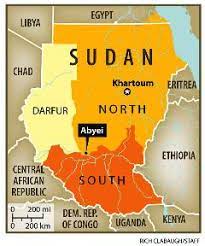By Hou Akot Hou
Several traders and residents in South Sudan’s Northern Bah El Ghazal State bordering conflict-hit Sudan are wary of hunger as they contemplate running out of food stocks following the closure of the common border.
Deng Bol, a livestock trader in Majok-Yithiou market bordering Sudan’s East Darfur, said he has ceased taking goats to the market where he barters them for sorghum with Sudanese traders.
Bol is among several South Sudanese who depend on the booming border trade with Sudanese, which has now been disrupted by the conflict between two rival generals that erupted last week in the capital, Khartoum.
“It is tough now; we can’t buy goats and drive them to the Majok-Yithiou market where we could get a sack of sorghum in exchange for two goats,” he told Juba Echo on Wednesday in Aweil town.
Bol said business was flourishing for many of them who were trading along the border, prior to the conflict in Khartoum.
He said currently there are no traders coming from Sudan to trade with them.
Bol added that vehicles which used to ferry Sudanese traders to Majo-Yithiou market have halted.
Northern Bahr El Ghazal State is one of the most food insecure states in South Sudan, following years of heavy flooding since 2019 which washed away crops, leaving thousands at risk of severe hunger.
Bol said that prices of sorghum have spiked in the aftermath of the political crisis in neighboring Sudan.
He said 3.7 kg of sorghum which previously traded for 1500 South Sudanese Pounds is currently going 2,200 SSP.
The drastic increase in prices comes at the time when the national government started selling imported sorghum from Sudan at subsidized prices to populations at high risk of hunger in flood affected states.











